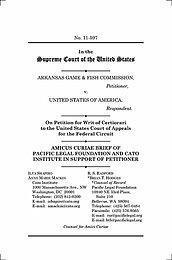Arkansas Game & Fish Commission v. United States
Learn more about Cato’s Amicus Briefs Program.
The Arkansas Game & Fish Commission owns and operates 23,000 acres of land as a wildlife refuge and recreational preserve; the preserve’s trees are essential to its use for these purposes. Clearwater Dam, a federal flood control project, lies 115 miles upstream. Water is released from the dam in quantities governed by a pre-approved “management plan” that considers agricultural, recreational, and other effects downstream. Between 1993 and 2000, the government released more water than authorized under the plan. AGFC repeatedly objected that these excessive releases flooded the preserve during its growing season, which significantly damaged and eventually decimated tree populations. In 2001, the government acknowledged the havoc its flooding had wreaked on AGFC’s land and ceased plan deviations. By then, however, the preserve and its trees were severely damaged, so AGFC sued the government, claiming damages under the Fifth Amendment’s Takings Clause. The district court awarded $5.8 million in lost timber and reforestation costs based on the substantiality of the government’s flooding and the foreseeability of the damage it caused. The Federal Circuit reversed that decision, holding that the flooding of private land can never be a taking unless that flooding is permanent. It further held that, in determining whether the government’s intrusion on AGFC’s land was permanent or temporary, courts must focus on the character of the policy behind the intrusion rather the effects of the intrusion itself. A taking cannot have occurred here because each deviation from the plan constituted a “temporary” policy, the court concluded, so AGFC had no constitutional remedy. AGFC is asking the Supreme Court to review its case; the Court itself has recognized that something less than a permanent invasion of land can constitute a compensable taking. Cato joined the Pacific Legal Foundation on an amicus brief urging the Court to hear the case and uphold the Fifth Amendment rights of property owners whose land is destroyed by the federal government. Our brief highlights the conflict between the Federal Circuit’s decision and both Supreme Court and lower court precedent. First, an invasion of land by flooding is no different from an invasion of land by any other means. Second, the government’s self-professed “intent” that a possible taking be “temporary” should have no bearing on whether a Fifth Amendment remedy exists when that taking has, in fact, occurred. Instead, the relevant inquiry should be whether the government caused permanent damage and, if so, how much. The Federal Circuit’s new rule — that, so long as it might be “temporary,” no government flooding can be remedied under the Fifth Amendment — runs afoul of the letter and spirit of a constitutional provision meant to compensate property owners for government intrusions on their land. We urge the court to grant AGFC’s petition and maintain constitutional protections for private property.

This work is licensed under a Creative Commons Attribution-NonCommercial-ShareAlike 4.0 International License.

